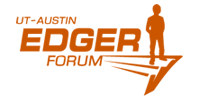2014 EDGER Forum
|
E |
xploration |
D |
evelopment |
G |
eophysics |
E |
ducation |
R |
esearch |
BENEFITS of PARTICIPATION include:
- Continuous and evolving access and interaction with MS and PhD students providing a stream of graduates ready to be employed by industry
- Participation in defining research directions and access to results of student, post-doc and faculty research
- Exchange of information and a way to transfer and share technological advancements between industry and academia
EDUCATION
A principal objective of the EDGER Forum is the education of students who have expressed interest in employment in the petroleum industry. About two-thirds of the graduate students associated with the Forum are seeking an MS degree and our graduate students commonly serve summer internships in the industry. The current enrollment of graduate students associated with the Forum is twenty one, with five (3 MS and 2 PhD) graduating in the last calendar year. Since 2000, thirty one graduate students have completed degrees (24 MS and 7 PhD).
RESEARCH
Another principal objective of the EDGER Forum is focused research on Analysis, Imaging and Interpretation of multicomponent seismic data, including P-P and P-SV AVO. The research focus must be broad enough to fully educate the graduated students yet focused enough to provide depth in the research program. Further, with a significant number of MS level (professional) students, many of the research directions are subdivided into individual projects supporting aspects of a greater investigative initiative.
FORUM
One of the major benefits of participation is, perhaps,“community activities” sponsored by the Forum. Oveall, symposia and workshops have provided a platform for exchange of ideas between industry members (contractors, equipment manufacturers and producers), academics and the graduate students. Further, the problem oriented multicomponent seismic database is now being widely used by the entire community. Discussions of research directions by industry and academic participants has led to student and faculty research projects. The EDGER Forum is in an excellent position to facilitate communication between the various elements encourage participation of the overall exploration and development of the geophysics community. As an element of the annual meeting, held in early spring of the academic year on the UT Campus, the EDGER Forum hosts an open technical symposium focused on a topic of interest to industry. This research focus has evolved to embrace Focus Areas of Application.
Focused Areas of Application include:
- Unconventional resources such as resource plays, tight gas sands and shale production
- Time Lapse Seismic & Reservoir Monitoring as it relates to monitoring & extraction of changes in reservoir properties
- Numerical Simulation of seismic wave propagation, imaging and inversion

